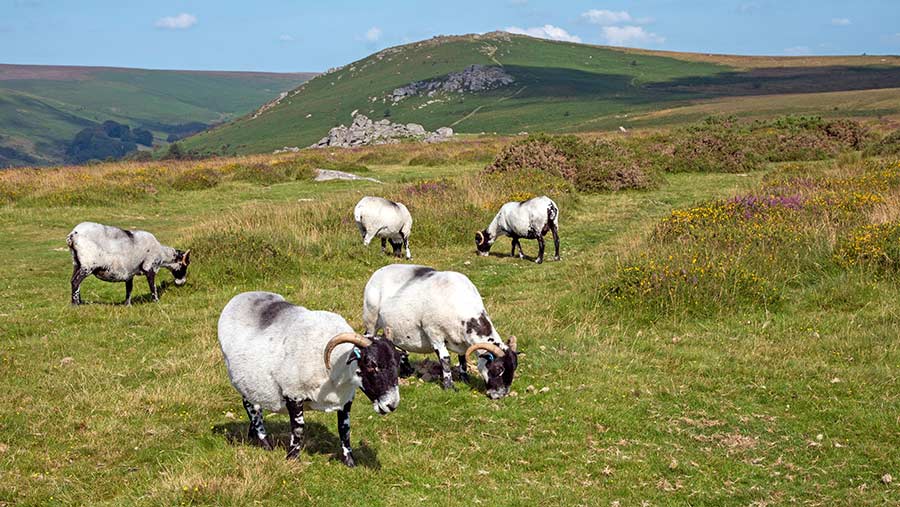Natural England told to change farmer engagement on Dartmoor
 © petert2/Adobe Stock
© petert2/Adobe Stock Natural England (NE) needs to significantly change the way it engages with commoners on Dartmoor and rebuild trust, an independent report has recommended.
Relationships between NE and commoners have broken down over the past two years, putting agri-environment schemes in jeopardy.
An independent report, led by David Fursdon, has published a series of recommendations on grazing and management of protected sites on the moor.
See also: Pressure to destock Dartmoor ongoing as review takes place
There is a recognition that grazing by three species – sheep, cattle and ponies – is an integral part of moorland management.
The levels of destocking proposed by Natural England had caused significant concern and an inevitable breakdown of the relationship between the agency and commoners.
Higher Level Stewardship (HLS) agreements were unlikely to be renewed in many cases, which could jeopardise collaborative agreements that deal with grazing management.
In order to facilitate future agreements, the report has recommended that HLS agreements are renewed to maintain relationships and appropriate management.
“If the farmers go, the recommendations on grazing and vegetation management will inevitably go with them,” said Robin Milton, a member of the NFU Uplands Forum and trustee for the Foundation for Common Land.
“And those recommendations are clear: active management of Dartmoor will be necessary to deliver the multiple objectives, both of environmental benefits and the cultural heritage of Dartmoor management.
“The whole commoning setup of Dartmoor is absolutely integral to everything that happens there.”
Additional stakeholders
Commoners have welcomed the report, but have raised concerns over some of the recommendations, especially around the creation of additional stakeholder bodies.
The report recommends the creation of a Dartmoor land use management group, but commoners are concerned that their input may be diluted by heavy stakeholder involvement.
“Overall, we welcome the recommendations in the report and commoners understand the need for collaborative action to deliver the environmental objectives and secure the future of their farming businesses,” added Mr Milton.
“But to deliver on the recommendations, Natural England needs to act on those areas that concern them immediately.”
Natural England response
Dave Slater, NE regional director for the South West, said: “Our priority has always been, and will always be, to work in the combined best interests of nature and farmers on Dartmoor.
“The review, however, makes it clear that we need to look at how we can better communicate this with farmers and set out what support is available to them. We have boosted the size of our team on Dartmoor as a first step in doing this.”
As the government’s adviser for the natural environment, Mr Slater said NE has a statutory duty to protect sites containing the nation’s most precious examples of wildlife and biodiversity.
But he added that despite the efforts of farmers, NE, the National Park Authority and wildlife organisations, there was evidence the ecological condition on Dartmoor had “declined significantly” and change was needed.
The Tenant Farmers Association (TFA) welcomed the report’s recommendations and said it was vital that Defra picks up the challenges it has laid out immediately.
TFA junior vice-chairwoman and Dartmoor farmer Helen Radmore said: “For the first time in a long time it feels like those of us who live and work on Dartmoor have been listened to properly.
“The ‘us and them’ approach that has been perpetuated by Natural England has been called out by this report. A shared vision which respects all those with rights and responsibilities on Dartmoor is the only way forward.”
Rare breeds acknowledgement
The Rare Breeds Survival Trust (RBST) said it was pleased the review acknowledges the benefits of the diversity of livestock species and breeds kept on the moor and the ways that native breeds, in particular, contribute to the delivery of a whole range of economic, environmental and social benefits.
But RBST chief executive Christopher Price said the review clearly recognises that current governance and management practices are not working for nature or farming, and need to change.
“The challenge for government going forward is to ensure it has the appropriate range of regulations and incentives in place, especially through Environmental Land Management, to ensure that the right breeds are being kept in the right places at the right times. We look forward to working with officials to ensure this happens,” he added.
